Privacy has become a battlefield between the partisans Google and Facebook recently, with Facebook caught hiring a PR firm to plant negative Google stories. As a hot-button issue, privacy can be fashioned to grab headlines. It plays on our fears of abusive power and Big Brother. But are we clear about why we’re afraid when it comes to some territory under the blanket called “Internet privacy”?
This weekend, a small news item appeared in the Boston Globe, noting that popular apps often ask users to allow their locations to be shared with the app. The story went on to wring its hands over the fact that most of the users are children, that this is an invasion of a child’s privacy, and so forth. Add this to the recent small furor about how the iPhone stores information about where you’ve used your phone, and you can feel the tension mount. Our iPhones are out to get us — and, they know where we are!
But are we being reasonable?
The iPhone and other phones store information about where you’ve called from for perfectly good technical reasons — namely, to allow the phone to use the nearest cellular tower as a way to determine your location when GPS response is slow or needs to be supplemented. Apple’s latest iOS upgrade seems to have contained the mistake of storing the information in an addressable location for too long — a caching problem seemingly of no major import in the grand scheme. But the PR problem and matching paranoia have contributed to a panel in the European Union advising that all cellphone data be treated as personal data, and given the highest level of privacy protection. The recommendation is non-binding, but it reveals the tenor around privacy issues in some quarters.
Unfortunately, the courts have not helped us differentiate between what is private and what is public. In a very nice recent essay entitled, “Gossip, Privacy, and Censorship,” Keenan Malik talks about the case of Princess Caroline:
. . . the European Court of Human Rights ruled that photographs of the Princess, which a German court had deemed acceptable since they had been taken in public places, had in fact violated her right to privacy and that, in its inimitable words, ‘a zone of interaction of a person with others, even in a public context . . . may fall within the scope of private life.’ In another case, the Court ruled that ‘a person’s reputation, even if that person is criticized in the form of a public debate, forms part of his or her personal identity and psychological integrity and therefore also falls within the scope of his or her “private life”’. The consequence of such rulings has been to make the distinction between the public and the private less and less clear.
Are audible statements and reflected light from your face “private” if others hear or see the results? It defies common sense.
But back to the newspaper article claiming teens are having their privacy violated because Angry Birds wants to know their location. Just because a business purveys its product online doesn’t mean there is some new boundary around privacy — and since this was in a newspaper, let’s use a newspaper company as an example. If I were in a fear-mongering mode, I could easily make newspapers into fearsome entities capable of numerous privacy intrusions:
- Newspaper companies often have your credit card information
- They know your personal details
- Since most identity theft occurs offline, due to improper disposal of data storage media or paper records, newspaper companies are potentially major sources of private information others could misuse
- Newspaper companies not only know where you live, but their employees or agents visit your house while you’re asleep
- Newspaper companies know when you’re on vacation, assuming you stop the paper
- If you fail to stop the paper when you go on vacation, newspaper companies mark when you’re away by stacking papers in your driveway so that others know
Why are apps asking for location information? In most cases, so they can let players compare their scores to those nearby.
Long before the Internet became pervasive, I remember setting up a bank account in a new city on the other side of the country. Just by entering my Social Security number, the bank teller was able to pull up all sorts of financial and employment information through one of the major services.
Targeting phones as sources of privacy concerns seems to miss the mark. The real privacy questions involve bigger systems we take for granted — massive credit reporting, banking, medical records, and personnel systems, where really sensitive information lives. A few emails, a geolocation string, and the contacts stored on my phone? And if these older, bigger, and more intrusive systems work silently in the background, barely registering in our consciousness yet quite possibly helpfully greasing the skids for commerce, travel, and civic involvement for us, is our nervousness proportional to the stakes before us?
Malik ends his essay talking about the risk of expanding definitions of privacy:
The danger is that privacy laws may come to replace libel cases as a means of silencing criticism. . . . At the very moment that Britain’s libel laws are being liberalized . . . its privacy law is being hardened.
But please remember, these are just my private thoughts. Let’s keep this between us . . .
Discussion
3 Thoughts on "Fear-Mongering, Confusion, and Paranoia About Privacy — Are We Sweating the Small Stuff?"
For me, the jury is still out–not exactly sure which side or amalgam of sides I am on–but a funny anecdote. A year or so after my father passed away–my late mother, then in her 80s, confided about looking up a former boyfriend from college–not on the internet, but in the phonebook–Hmmm, remember the phonebook?
A great story. Cities have created a sense of anonymity that we sometimes mistake for privacy, and when anonymity is broken, it feels like an invasion of some kind. But if you’ve ever lived in a small town, you know what privacy is, and it’s different than anonymity. Anonymity you can get passively, privacy you have to work for. A phonebook was (and still is) a great way to eliminate anonymity and still have privacy. And if you’re looking for someone from your past, it’s a nice place to start.
I agree wholeheartedly that what can only be termed hysteria over the grossly unspecific notion of “privacy” is likely to spur policy responses (both formal and voluntary) that unleash cascades of unintended consequences. If we fail to get in front of it as an industry, we risk having a substantial array of valuable information services (and business models that drive them) curtailed or prevented, and for no good reason.
There was a great article written by Outsell entitled “Do Not Track – Just Spam Me with Irrelevant Junk”–I commend it to all the readers of this post.
I spend my days trying to better understand the users of professional content so that we can deliver more useful, more relevant, more integrated content experiences that those users value. This inherently involves storing information about them; without that possibility, many of our approaches would be stopped cold.
Note that this does not mean we ought to do anything we like with user data. But there’s world of difference between sending someone another J Crew catalog and alerting them to a dangerous drug interaction. The current vogue to unilaterally inveigle for sweeping, ill-considered limitations on user tracking is populist red meat, with all the ignorance and oversimplification that implies.




